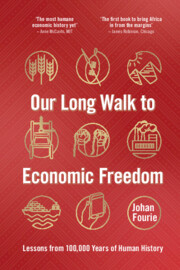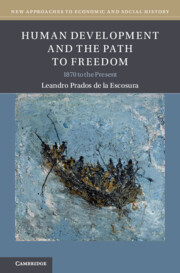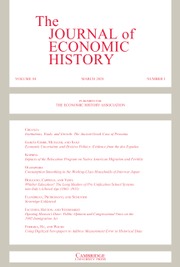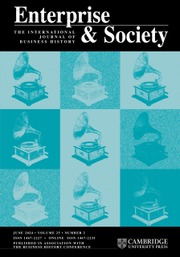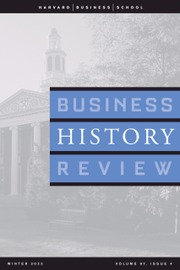Our Long Walk to Economic Freedom
Lessons from 100,000 Years of Human History
- Author: Johan Fourie, University of Stellenbosch, South Africa
- Date Published: August 2022
- availability: Not yet published - available from November 2024
- format: Hardback
- isbn: 9781009228466
Hardback
Other available formats:
Paperback, eBook
Looking for an inspection copy?
This title is not currently available for inspection. However, if you are interested in the title for your course we can consider offering an inspection copy. To register your interest please contact [email protected] providing details of the course you are teaching.
-
Our Long Walk to Economic Freedom is an entertaining and engaging guide to global economic history told for the first time from an African perspective. In thirty-five short chapters Johan Fourie tells the story of 100,000 years of human history spanning humankind's migration out of Africa to the Covid-19 pandemic. His unique account reveals just how much we can learn by asking unexpected questions such as 'How could a movie embarrass Stalin?', 'Why do the Japanese play rugby?' and 'What do an Indonesian volcano, Frankenstein and Shaka Zulu have in common?'. The book sheds new light on urgent debates about the roots and reasons for prosperity, the march of opportunity versus the crushing boot of exploitation, and why it is the builders of society – rather than the burglars –who ultimately win out.
Read more- Shifts the view of long-run economic development from a Eurocentric to a more balanced perspective
- Provides a more nuanced understanding of the reasons humans have flourished (or where this flourishing has been delayed) based on new research findings
- For use on global economic history courses to offer an alternative perspective to existing overviews
Reviews & endorsements
'In three dozen short but wide-ranging chapters, Johan Fourie demonstrates that recent research in economic history can be both enlightening and fun. As entertaining as it is instructive, this slim volume provides a perfect introduction for students.' Joel Mokyr, author of A Culture of Growth
See more reviews'Africa, the Forgotten Continent, comes into its own in Fourie's engaging romp through human history. Good: our ancestors, after all, were all Africans, though most of us are less varied than people in our homeland on the veldt. The future of Africa is therefore bright. Fourie's brilliant account shows why. Deidre McCloskey, author of Beyond Positivism, Behaviorism, and Neo-Institutionalism in Economics
'Johan Fourie is an extraordinary economic historian. This book allows us to understand our world today by taking the very long run perspective on humanity's struggle against poverty, from the Neolithic to the Information Age. He shows how economic growth is possible and why poverty is not inevitable. This is the book for all those who are willing to learn from humanity's long history to achieve a world in which more and more people can leave the deep poverty of the past behind.' Max Roser, founder of Our World in Data
'Fourie is leading a renaissance of African economic history, and Our Long Walk to Economic Freedom gives every interested person a way to access his scholarship and that of other key scholars. It is destined to become a must-read in higher ed syllabi.' Marianne H. Wanamaker, co-Editor at Explorations in Economic History
Customer reviews
Not yet reviewed
Be the first to review
Review was not posted due to profanity
×Product details
- Date Published: August 2022
- format: Hardback
- isbn: 9781009228466
- length: 290 pages
- dimensions: 222 x 145 x 22 mm
- weight: 0.51kg
- availability: Not yet published - available from November 2024
Table of Contents
Introduction: How do we thrive?
1. Who are the architects of Wakanda? African economic historians and the stories we tell
2. What happened at Blombos in 70,000 BCE? The Out-of-Africa hypothesis and the peopling of the world
3. Why are the Danes so individualistic? The Neolithic Revolution and the rise of civilisations
4. Why does isiXhosa have clicks? The Bantu migration
5. How did Joseph and his eleven brothers solve the three economic problems? Custom and command in the ancient world
6. What do Charlemagne and King Zwelithini have in common? Feudalism
7. Why do Indians have dowry and Africans lobola? Precolonial African economic systems
8. Who was the richest man ever to live? The spread of Islam in Africa and the Crusades
9. How did 168 Spanish conquistadores capture an empire? Europeans in the New World
10. Why was a giraffe the perfect gift for the Chinese emperor? The Indian Ocean trade and European imperialism
11. Who visited Gorée island on 27 June 2013? The Atlantic slave trade and Africa's long-run development
12. What is an incunabulum? Book printing and the Reformation
13. Who was Autshumao's niece? The arrival of Europeans in South Africa and the demise of the Khoesan
14. What did Thomson, Watson & Co. purchase? The emancipation of the enslaved
15. What do an Indonesian volcano, Frankenstein and Shaka Zulu have in common? The Mfecane and Great Trek
16. Why was the spinning jenny not invented in India? Science, technology and the Industrial Revolution
17. Why did railways hurt Basotho farmers? South Africa's mineral revolution
18. What did Sol Plaatje find on his journey through South Africa? Property rights and labour coercion
19. Why can you have any car as long as it is black? The rise of American industry
20. What does a butterfly collector do in the Congo? The Berlin Conference and the colonisation of Africa
21. Who wrote the best closing line of modern literature? The Great Depression and the New Deal
22. How could a movie embarrass Stalin? Russia and the turn to communism
23. Who is the perfect soldier? The causes and consequences of the Second World War
24. What was the Great Leap Forward? Mao Zedong, famine and the Cultural Revolution
25. Why should we cry for Argentina? A country reverses
26. Who was the last king of Scotland? African independence struggles
27. How did Einstein help create Eskom? South Africa industrialises
28. Why would you want to eat sushi in the Transkei? The economics of apartheid
29. Why do the Japanese play rugby? The rise of the East Asian economies
30. What do Lego and the greatest invention of the twentieth century have in common? The second era of globalisation
31. What is funny about Moore's law? ICT and the Fourth Industrial Revolution
32. What bubbles in Iceland? The Global Financial Crisis of 2008
33. What did The Economist get spectacularly wrong? Africa after 2000
34. Will Madiba's Long Walk to Freedom ever end? The first 25 years of democracy and the future of South Africa
35. What should no scholar ever do? Predicting the future
Epilogue: How do you win a World Cup?
Sorry, this resource is locked
Please register or sign in to request access. If you are having problems accessing these resources please email [email protected]
Register Sign in» Proceed
You are now leaving the Cambridge University Press website. Your eBook purchase and download will be completed by our partner www.ebooks.com. Please see the permission section of the www.ebooks.com catalogue page for details of the print & copy limits on our eBooks.
Continue ×Are you sure you want to delete your account?
This cannot be undone.
Thank you for your feedback which will help us improve our service.
If you requested a response, we will make sure to get back to you shortly.
×
